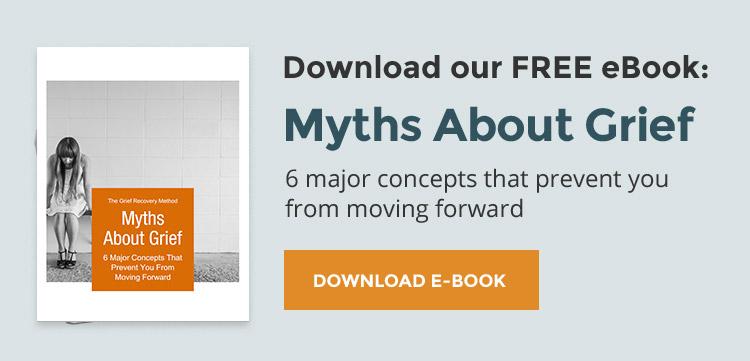One of the difficulties with hearing "time heals all wounds" — it doesn't; please read our blog post on this topic — is that sometimes people will then expect that, not only will "all wounds" be healed, but that it can be done in a set amount of time.
So how long does grieving take?
Grief recovery itself is an ongoing process that takes work and effort, with numerous steps along the way. And its duration is as unique as every individual, because the ways people deal with their losses are unique to them and their personal situations.
Perhaps one of the greatest erroneous presumptions is that the process of dealing with grief will be orderly, and it will follow a step-by-step process, or that each step will take a specific amount of time.
Just because there's a method for grief recovery doesn't mean it will follow a certain order or be accomplished in a certain amount of time.
Loss is loss, and whether it's loss of trust, loss of approval, loss of a relationship, loss of safety, or loss of a loved one, every single one of these brings its issues to a major grief crisis. And even when we think something is "better," this isn’t true: we can be triggered to re-experience those memories, and bring about a grieving moment again.
That is why grief can remain painfully tangible for decades. If there has been no work done on that loss over a person's life, even while other losses have also occurred, there's a high possibility of being emotionally paralyzed after a new loss. It's not just the latest crisis, but the compounding effect of not facing the other losses, that can cause problems.
A great disservice has been done to the grief recovery process by the propagation of a misinterpreted series of steps created by Dr. Elisabeth Kubler-Ross. Her "five stages" — denial, anger, bargaining, depression, and acceptance — were originally developed to explain stages of dying, not grief. To imply that grieving follows certain stages and therefore should be completed in an orderly fashion over a certain period of time simply isn't true.
Grieving is an individual process that's disorderly at best. The whole point of grief recovery is to take steps toward recovery, rather than focusing on how much time it will take.
If you found this article useful, you may also want to read Russell's article "Time Does Not Heal. Actions Do."



























Comments
Karen Lloyd
Thank you so much for this article! I've been grieving for 12 years that I know of... Until the death of my mother fiancée and daughter, I have learned that there are other kinds of loss that causes grief. I want information on the subject because I'm still dealing with it daily. Can you help me
Anonymous
Hi Karen, thank you so much for your post and question. We are always here to help. Feel free to call us at 800-334-7606 or e-mail us at [email protected]
Colleen Freck
Brittany Lane, M.S., Director of Specialist Relations and Events
KAREN SIDES
stephen moeller, grief recovery specialist
RHonda Gullette
RHonda Gullette
stephen moeller, grief recovery specialist
It is not surprising that you are struggling and have no energy. The emotional pain of grief can really drain your energy level. It is hard, if not impossible to support others when you really need support yourself!
Please check to see if there is a Certified Grief Recovery Specialist in your area using the Grief Recovery Method. You can check this out at www.greifrecoverymethod.com. If ther is not one near you, please get a copy of "The Grief Recovery Handbook," which is available at most bookstores or at that website. Of all of the books on grief and loss, I have found this one to be the best. It is not just the story of someone else's pain and how they muddled through it, but rather a road-map to taking action. It is not about you forgetting your loved one, but rather a tool to help you to be able to enjoy your fond memories without the tears that come with not being able to make more memories! The authors walk with you on this journey to deal with the pain in your heart, whereas most of the people you might talk to try to help you by talking to your head with logical reasons why you should not feel bad. You have a broken heart, not a broken head! Logic never heals a broken heart!
My thoughts are truly with you!
Add new comment